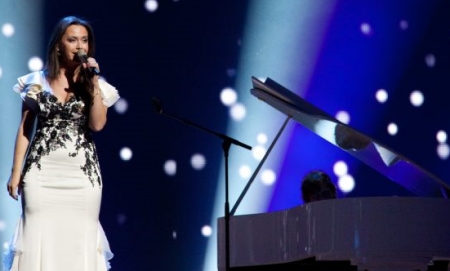We’re about a week into ESC Insight’s coverage of the 2014 Eurovision Song Contest, and we hope you’ve been enjoying our podcasts, interviews, and editorials on the goings-on so far. But we realize that a community can often develop its own individual lexicon, and we’d hate to leave our listeners and readers out of the loop!
So, courtesy of the ESC Insight Team, here’s a quick run-down of some of our favorite terms. Use them to pepper your conversations on Eurovision punditry! Impress your friends! Confuse your family!
Alt-Fodder /ˈɔlt ˈfɑdər/
(noun) The song that you surreptitiously play for your friend who hates Eurovision, just for the satisfaction of watching them awkwardly backpedal when you reveal the tune’s origin. Examples: “Siren”, “Calm After the Storm”, “Kedvesem”
Azerjibin /ˌæˈzərˌʒɪbən/
(proper noun) An idealized semi-fictional Caucasian state, rife with red tape, insane drivers, and some of the best lamb kebabs this side of the Caspian. Introduced to us by EBU Spokeswoman Lynda Woodruff, Azerjibin is also referred to as Tubakoo or simply the “Glorious Republic”.
Bergendahl /ˈbərgənˈdɑl/
(noun) A shock non-qualifier that leaves swarms of dedicated fans rending their garments in grief. Example: “This is My Life” (obviously).
Bond Theme /ˈbɑnd ˈθiːm/
(noun) A big, brassy, dramatic song that can be easily imagined over the opening credits to a certain genre of British spy movies. High production values abound. Examples: “Rise Like a Phoenix”, “Maybe (Forse)”, “Work Your Magic”.
Cotton Candy /ˈkɑtən ˈkændiː/
(adjective) The qualities of a song, generally dance-pop, that is light, fluffy, easily-consumable and enjoyable, but lacks depth or substance, just in the way that candy floss dissolves on your tongue as you eat it. Examples: “Aphrodisiac”, “Rockefeller Street”. See “sorbet song”.
Fanwank /ˈfænˌwæŋk/
(noun) Slightly pejorative. A divisive Eurovision song, beloved by one large, vocal segment of the fan population, but pooh-poohed by another, just as large, just as vocal segment. Generally a traditional pop song, fanwanks may often underperform on the scoreboard. Examples: “Crisalide“, “Tha ‘Ne Erotas“.
Gobshite /ˈgɑbˌʃoɪt/
(noun) An idiot, or a person who tends to run their mouth off without saying anything of actual substance. Popularized in Eurovision circles by Linda Martin during the Irish National Final, but in use for centuries.
Hot Mess /ˈhɑt ˈmes/
(noun) The explosion of activity when a delegation decides to put too many bells and whistles into their three minutes on stage, resulting in distraction and a diminished score on the leaderboard. Examples: “Social Network Song”, “Be My Guest”, “Carry Me in Your Dreams”. See “pull a Moldova”.
Lena Philippson Syndrome /ˈliːnə ˈfɪlˌlɪpsˌsən ˈsɪnˌdroʊm/
(noun) The phenomenon that occurs when an artist makes it to Eurovision after many attempts at their National Final with their weakest entry. Examples: Sanna Nielsen (7th attempt), Lena Philipsson (4th attempt), Donny Montell (6th attempt).
OGAE /ˈoʊ ˈdʒiː ə ˈiː/, also /ˈoʊ ˈgeɪ/
(noun) Acronym, from the French “Organisation Générale des Amateurs de l’Eurovision (General Organization of Eurovision Fans)”. This collection of approximately 40 fan-focused groups are made up of thousands of card-carrying superfans, many of whom can be seen in the front rows of a Eurovision audience, waving inflatable hammers, bedecked in suits the in the colors of their national flags, or bringing in woefully huge signs to cheer on their favorites.
Political Voting /pəˈlɪtɪkəl ˈvoʊtɪŋ/
(noun) The misunderstood phenomenon of voting blocs. Rather than sending or eschewing votes for political reasons (“Country X will shut off Country Y’s gas if they don’t vote for them!” “Nobody likes us because of Iraq!”), traditional voting blocs are generally more focused on more deep-seated connections, such as language, ethnic makeup, or shared cultural heritage.
Pull a Moldova /ˈpʊl ə mɑlˈdoʊvə/
(verb) The explosion of activity when a delegation somehow successfully decides to put too many bells and whistles into their three minutes on stage, resulting in an increased score on the leaderboard. Examples: “Lautar”, “Love Me Back”, “It’s My Life”. See “hot mess”.
Prosecco /proʊˈsekoʊ/
(noun) Generally cheaper than Champagne, this Italian sparkling white wine is the perfect Eurovision libation. Just ask Dr. Eurovision.
Random Draw /ˈrændəm ˈdrɔ/
(noun) The system of determining the running order by sheer chance, rather than a producer-led draw. According to the EBU, this supposedly has no effect on the eventual results of the competition (although we here at Insight suggest otherwise…).
Rossinelli /ˈrɔˈsɪnˈneliː/
(noun) A generally decent, yet underrated song that defies odds, miraculously qualifies from its Semi, only to be woefully forgotten on the night of the Final. Examples: “In Love for a While”, “Only Love Survives”, “Lose Control”
Sašenko /sæ’ʃeŋkoʊ/
(noun) A song, usually a ballad, that was completely ignored, if not panned, in the run-up to the competition, only for fans to realize later that it was actually pretty damn good. Often accompanies unexpected chills and goosebumps in the fan press that nobody likes to admit to in public. Also referred to as a “Mecha-Streisand”. Examples: “C’est ma vie”, “Korake ti znam”.
Schlager /ˈʃlɑgər/
(noun) A genre of pop songs, originating primarily in Scandinavia and other areas of Northern Europe, often incorporating key changes, catchy melodies, or sweet lyrics. The genre is well-loved by many Eurovision fans, but induces eye-rolls and nausea in others. Examples: “Invincible“, “Hero“.
Skirty-Rippy-Offy /ˈskərtiː ˈrɪpiː ˈɔfiː/
(noun) An over-the-top, unnecessary, or unexpected mid-song costume change. Examples: “Making Your Mind Up”, “Celebrate”, “Love Me Tonight”.
Shock Qualifier /ˈʃɑk ˈkwɑləˌfaɪr/
(noun) Anything that isn’t fanwank that qualifies.
Sorbet /sɔrˈbeɪ/
(adjective) The quality found in a generally pleasant song that, while sweet and enjoyable, is doomed to be forgotten by the time the next song is played, much like the cup of sorbet that is served between heavier plates in a multi-course dinner. Examples: “Et uus saaks alguse“, “När jag blundar“. See “cotton candy song”.
Vanilla /vəˈnɪlə/
(adjective) A decently inoffensive song that racks up a smattering of points from a wide swath of the voters and juries, often resulting in a high final score and muttering of “how the heck did that do so well?” from the general populace. After all, vanilla, while bland, is the world’s most popular flavor of ice cream. Examples: “Running Scared”, “What If”, “Me and My Guitar”.
Are there any that you would add to our glossary? Expand our lexicon, and leave a comment!












Superb article – it should be put into a printer-friendly form so it can be placed alongside all our printed scorecards…lol
Although I have spotted that you spelt “World” wrong in the title…or is that another Eurovision term I have yet to come across? 🙂
We’ve caught that now!
Doesn’t Bergendahl also mean “the magic instrument that still plays on the backing track despite being put down by the lead artist” or is that a different word?
Finally, some explanation for “inflatable hammer” references. The internet really let me down on that one.
I know you’re posting terms in actual use, but I kept thinking of “Rise Up” as *chutney*
Rationale: It mixes diverse and chunky ingredients to add interest, but has an overall consistency that allows unpopular bits (rap) to blend in and be ignored. It’s very easy to enjoy, but disregards the finer aspects of songwriting and composition, just as sauces smother indifferent cooking or poor ingredients. A guilty pleasure for anyone with a pretentious streak.
Closest to “Cotton Candy” in your terms.
We definitely need more culinary terms.
Zolan, I think that’s genius! Chutney!
And much agreed on more use of culinary terms for Eurovision. I can then combine two loves and use them across my vocabulary.
In my household, we’ve been speaking a lot about pulling a ‘Tolmachevy’ too. Worlds worst attempt at pretending to play an instrument in a video clip.
Even Pollaponk from Iceland with their cardboard instruments were more convincing.
To us, a shock non-qualifier is “doing a Kate Ryan”, while a “Bergendahl” is when a country loses their 100% qualification record
Loving the “chutney” one…
Peter, if we’re following your definition of a “Bergendahl”, then Ovi might be pulling a “reverse Bergendahl” with his current staging. The piano solo starts before he gets to the (obviously fake) instrument!
Another one that I find myself using a lot here that could use some measure of formalization:
“Grrrrr”
(noun) The intangible quality of absolute fierceness and sass in a female lead singer, often coupled with deep or otherwise unique vocals. Examples: Mei Feingold, Emma Marrone, Poli Genova, Amandine Bourgeous
@Sam: I’ve just seen the video for Romania now! Oh my, that’s hilariously stupid and deserves a classification all by itself – “Doing an Ovi”, perhaps? 😀
2 expressions I and my real and virtual friends use regularly:
1. “quality screaming” – for stong vocalists overdoing it in typical ESC style. Example: probably Ruth Lorenzo this year
2. “to do a Belarus” – for broadcasters changing a song that won the NF
And what about ‘marmite’ – or as we would say in Oz – ‘vegemite’?
Loving these additions…and the continued food connections! 🙂
Ooh, mustn’t forget “Marmite.” That’s a Eurovision staple food.
There certainly has been some hilariously bad instrumiming, but I suspect the sisters will offer many options for what to lend their names to.
“Instrumiming” is what I call that Eurovision oddity for want of a better name. It’s technically dancing, but everyone agrees to suspend disbelief and treat it like playing live. The juries are so impressed when people hold instruments correctly for three minutes.
Having stumbled across the expression on OnEurope, I think “Curate’s Egg” deserves much more use in ESC circles. I struggle with it every year.
One Britishism you take for granted:
“Over-egg [the pudding]” (I’m guessing Yorkshire)
Although, it’s usually pretty easy to work out from context.
A Bergandahl is actually when an unbeatable country that basically gets automatic qualification sends an entry so so bad, that they actually manage to do the impossible and not qualify
@Max: “This Is My Life” is NOT bad! You take it back! :p
I can’t remember who said it, but in Norway, I was sitting amongst OGAE UK and when Anna Bergendahl didn’t qualify, somebody said, “Anyone want to buy 20,000 orange glow sticks?”
Floppy Molly /flɑpi- mɑli/ : (noun) a song that is beloved by the press and the bettings but ends up near the bottom of the table. (see a Bergandahl)
Samantha Ross – and “grrrrr” is, I’ve noticed, an easy way to send an excellent song without having to deal with too many of those pesky points.
Calvin, let’s hope someone told that to Nina Sublatti…